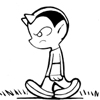Traducció - Búlgar-Italià - ti na italianski marco li se nari4a6? da ne e...Estat actual Traducció
Aquest text està disponible en els següents idiomes:  
 La petició d'aquesta traducció és "només el significat" | ti na italianski marco li se nari4a6? da ne e... | | Idioma orígen: Búlgar
ti na italianski marco li se nari4a6?
da ne e towa ima moderno ne6to?
ne6to mai mi se prawi6 na lud, taka li?
razbiram |
|
| tu in italiano ti chiami marco? | | Idioma destí: Italià
tu in italiano ti chiami marco? è un nome che va di moda? fai il matto con me, è così? capisco |
|
Darrera validació o edició per apple - 16 Abril 2007 15:21
Darrer missatge | | | | |
14 Abril 2007 15:42 | | 
appleNombre de missatges: 972 | This translation should be only meaning (latin alphabet insted of cyrillic + numbers 4 and 6).
Can an administrator change its status, with no damage for the translator? | | |
14 Abril 2007 17:02 | | 
MaskiNombre de missatges: 326 | Hm, does it matter? What will be the difference in the translation if we make the source "meaning only"? I feel i'm missing the point of this "meaning only" the way everyone's making a big deal out of it?
P.S. Numbers are instead of slav diacritics. | | |
15 Abril 2007 09:46 | | | Done.
Meaning only translation are more flexible with the rules, they can have a dirty form etc... They are not taken into account for the calculation of the language equivalences. And they might be removed from the database after they are done and after a couple of weeks/month. (For now they are not removed but if the databse is growing up too fast, I will set this feature).
| | |
25 Abril 2008 18:40 | | | Sono dei suoni che nell'alfabeto delle lingue neo-latine non sono rapresentate da lettere uniche ma da più lettere:" 4 " e " 6 " rispettivamente " Ч " e " Ш " nell'alfabeto bulgaro. La prima effettivamente assomiglia al numero 4 ed il suono è quello della "C" nell'alfabeto italiano (ma solo il suono quando la si pronuncia nell'alfabeto stesso: "Ci"...il primo suono della parola "ciao" possibilmente senza la pronuncia della "i" finale)
La seconda corrisponde alla pronuncia " sc " cioè... il primo suono della parola "sciabola" ...anche quì lo stesso discorso per la "i"
Altre lettere come " Ю " e " Я " corrispondono al suono " iu " e " ia "
Spero di essere stato chiaro...senza verifica sonora.
Spero di essere
|
|
| 
 La petició d'aquesta traducció és "només el significat"
La petició d'aquesta traducció és "només el significat"
 La petició d'aquesta traducció és "només el significat"
La petició d'aquesta traducció és "només el significat"